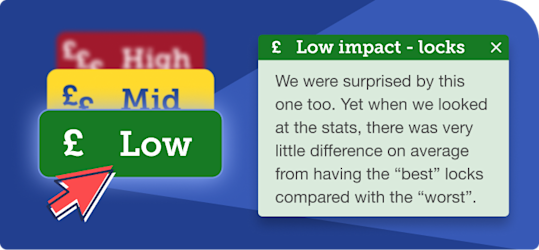Halve broadband costs & double speed!
April's price hikes are showing on bills for the first time. What do you now pay for broadband?
New. Get 264Mb £21/mth or 500Mb £27/mth. Or if you can't get fibre, try 150Mb mobile broadband
You might be in for a surprise when you see what your broadband now costs. Check your bill, or log in to your account. Despite new Ofcom rules banning inflation-linked annual price hikes, around seven million households remain on older contracts that still allow it, with 6% being typical. Don't just let them walk the price up each year - many of you are out of contract, free to switch and being ripped off by paying over the odds...
Typical out-of-contract costs
BT £840/yr 67Mb, Sky £520/yr 30Mb,
Virgin £650/yr 132Mb Cheapest deal
Many can pay the equivalent of just £250/yr 264Mb, saving £100s
Our broadband comparison tool amalgamates 30 providers' (biggies and a growing number of local players) short-lived promo deals sourced from a range of sites. This is as many as we can, and shows what's available at your postcode. These deals are usually NOT available direct, so use the specific links below. The cheapest broadband deals include...
All via our Broadband Comparison as it's postcode-specific |
New.
Community Fibre 550Mb broadband-only '£18/mth' (2yr contract) Local Available in many London boroughs and parts of Surrey and Sussex. This deal is £20/mth (rises by £2/mth in April 2026 & 2027), so you'll pay £508 over the 2yr contract. Plus you'll be emailed a choice of an £80 voucher for Amazon, Tesco, Selfridges and many others within 4mths of your first bill (do check your junk folder if not received). Factor that in as a discount and it's equivalent to £17.84/mth. Service rating: 8.4/10 (Good)
New.
Virgin 264Mb broadband-only '£21/mth' (18mth contract)
Available to 60% of homes
National Cheapest 100Mb+ fibre deal. You pay £25/mth (rises by £3.50 next April), but you get an AUTOMATIC £100 bill credit added to your first bill, so there's nothing to pay for the first four months. With that and the price rise factored in, you pay £374 over the 18mth contract, making it equivalent to £20.80/mth. Service rating: 3.4/10 (Poor)
Ends Wed.
Vodafone 150Mb broadband & digital line '£22/mth' (2yr contract)
Available to 70% of homes
National Cheap 100Mb+ fibre with decent service. You pay £26/mth (rises by £3/mth in April 2026 & 2027), so you'll pay £666 over the 24mth contract. Plus you'll be emailed a choice of a £140 voucher for Amazon, Tesco, Sainsbury's or M&S within 4mths of your first bill (do check your junk folder if not received). Factor that in as a discount and it's equivalent to £21.92/mth. Service rating: 5.5/10 (OK)
Ends Thu.
Sky 500Mb broadband & digital line '£27/mth' (2yr contract)
Available to 70% of homes
National Cheapest 500Mb+ fibre. You pay £32/mth, plus you'll be emailed a choice of a £120 prepaid Mastercard or shopping voucher within 4mths of your first bill (do check your junk folder if not received). Factor that in as a discount and it's equivalent to £27/mth over the 2yr contract. Service rating: 5/10 (OK). Note: Sky opts out of giving price rises in advance, but that means if it raises prices mid-contract, you can leave penalty-free.
New.
Virgin 516Mb broadband-only '£30/mth' (18mth contract)
Available to 60% of homes
National Cheap 500Mb+ fibre. You pay £33/mth (rises by £3.50 next April), but you get an AUTOMATIC £85 bill credit added to your first bill, so there's nothing to pay for the first two months. With that and the price rise factored in, you pay £533 over the 18mth contract, equivalent to £29.63/mth. Service rating: 3.4/10 (Poor)
New.
Three 5G mobile broadband-only '£18/mth' (2yr contract)
National - MOBILE broadband though If you struggle to get fast fibre where you are, this is a good option. The router gets its connection from mobile signals, not cables into your home. Speeds vary, but in areas with decent signal, you can expect around 150Mb (some can only get the 4G option) - check expected signal strength in your area using its coverage checker and there's a 30-day grace period in which you can cancel.
There are a few options, and the exact deals depend on which you get, but with its 5G indoor broadband service you pay £19/mth (rises by £2/mth in April 2026 & 2027), so you'll pay £484 over the 2yr contract, plus you'll be emailed a choice of an £60 Amazon, Tesco, Sainsbury's, M&S or Deliveroo voucher within 4mths of your first bill (do check your junk folder if not received). Factor that in and it's equivalent to £17.67/mth.
On Universal Credit or similar benefits? Try a social tariff. Many providers offer special discounted social broadband tariffs, which give long-term cheap prices of usually £13/mth to £20/mth for 30Mb+. Add your postcode via the link above and, within your search results, you'll see the social tariffs local to you.
- Ordered by our 'equivalent cost', which adds all costs, deducts promo credits and averages over the contract so you can compare easily.
- Broadband service ratings tend to be worse than other sectors, so all scores are lower. See our full broadband service poll results. |
At least 50% of customers must get the advertised speeds at peak times. All bigger providers must also indicate your estimated minimum speed pre-application (this doesn't apply to Three's mobile broadband, but it tells you speed in advance and gives you cancellation rights).
Slow broadband? Before switching, test your speed - is the issue just your Wi-Fi or is it the connection to your home? Do a speed check - first via Wi-Fi, then by plugging your device into the router (if you can). If Wi-Fi's a lot slower, try our speed-boosters.
You no longer need to contact your current provider to switch. Until recently, switch broadband and with some providers (including Virgin), you've had to contact both your old and new provider to do it (sometimes leaving you paying for both during the overlap). Regulator Ofcom has now changed the rules, rolling out a 'One Touch Switch' service that means the new firm should seamlessly sort it for you.
Don't want to switch? Haggle. In our December poll, the vast majority of those who'd haggled with the big broadband firms were successful. Use the deals above as a benchmark to help get costs down. Read full Broadband haggling tips.
Switching usually only means about two hours' downtime - whether an engineer comes depends on what you're getting. You're told the switch time, and most don't need an engineer to set it up. There are exceptions to this - if you're moving to or from Virgin, you may need one (you're told before applying). Plus, if you're getting fibre to the premises (FTTP), which is where you have a fibre cable fitted to bring the connection into your home too, allowing speeds of up to 1,800Mbps, it may need someone to look at the externals of your home (but not to come into it).
Members of cashback sites can sometimes undercut deals. In some cases, the cashback can mean these sites undercut promos elsewhere, though sometimes the deal differs - so check carefully. More in Top cashback sites. 









